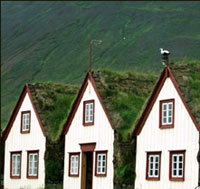
|
|
Iceland has overtaken Norway as the world's most desirable country
|
Iceland has overtaken Norway as the world's most desirable country to live in, according to according to the latest UN index on human development published on Tuesday that again puts AIDS-afflicted sub-Saharan African states at the bottom.
Iceland, Norway, Australia, Canada and Ireland dominate the top places but the United States slipping to 12th place from eighth last year in the UN Human Development Index.
But the index finds that all 22 countries falling into its "low human development" category are in sub-Saharan Africa, with Sierra Leone last.
In 10 of these countries, two children in five will not reach the age of 40, said the compilers at the UN Development Program. Last year's report said HIV/AIDS had had a "catastrophic effect" on life expectancy in the region.
The index ranks 175 UN member countries plus Hong Kong and the Palestinian territories. It does not include 17 countries, including Iraq, Afghanistan and Somalia, because of inadequate data.
Norway had held top spot for six years but was edged into second place by Iceland this year because of new life expectancy estimates and updated figures for gross domestic product, or GDP, the report said.
The United States scores high on real per capita GDP, which at $41,890 is second only to that of Luxembourg ($60,228), but less well on life expectancy -- joint last in the top 26 countries, along with Denmark and South Korea, at 77.9 years.
Japanese have the longest life expectancy -- 82.3 years -- and Zambians the lowest, at 40.5.
The report said most countries had seen their human development index rise over the last 30 years, but in 16 it was lower than in 1990, and in three -- the Democratic Republic of Congo, Zambia and Zimbabwe -- lower than in 1975.
Per capita GDP is 45 times higher in Iceland than in Sierra Leone.
The United Nations has published its human development index every year since 1990.
點擊查看更多雙語新聞
(Agencies)
|
據聯合國本周二公布的“人類發展指數”最新報告,冰島取代挪威成為全球最適合居住的國家,飽受艾滋病之苦的撒哈拉以南非洲國家再次排在最后。
冰島、挪威、澳大利亞、加拿大和愛爾蘭在“人類發展指數”排行榜上名列前茅,而美國從去年的第8位跌至第12位。
但今年的 “人類發展指數”排行顯示,居于“低人類發展水平”之列的所有22個國家都位于撒哈拉以南非洲地區,塞拉利昂排在最后一名。
據聯合國開發計劃署的編撰人員介紹,在其中的10個國家,五分之二的兒童活不到40歲。去年的“人類發展指數”報告稱,艾滋病對這一地區的人均預期壽命造成了“災難性的影響”。
該指數共對175個聯合國成員國以及中國香港地區和巴勒斯坦進行了排名,但伊拉克、阿富汗和索馬里等17個國家因數據不充分,未參與排名。
此前,挪威在過去的六年里一直占據榜首,但今年,由于最新統計的人均預期壽命和國內生產總值兩項數據被冰島趕超,因此下降至第二位。
美國的人均實際GDP高達4.189萬美元,僅次于盧森堡的6.0228萬美元;但人均預期壽命得分相對較低,以77.9歲與丹麥和韓國并列第26名。
日本的人均預期壽命最長,為82.3歲;贊比亞最短,只有40.5歲。
報告稱,大多數國家和地區的人類發展指數在過去三十年中都有所上升,但今年有16個國家的指數低于1990年,剛果民主共和國、贊比亞和津巴布韋的指數低于1975年。
冰島的人均GDP為塞拉利昂的45倍。
聯合國從1990年開始發布“人類發展指數”年度報告。
(英語點津姍姍編輯)
|